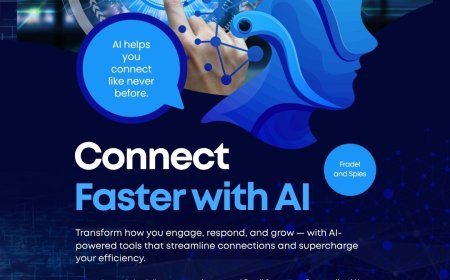Everything You Need to Know About Healthcare Software Development Services
Discover everything you need to know about healthcare software development services — key benefits, features, compliance, and how they improve patient care.

Introduction
In recent years, the healthcare industry has experienced a major transformation through technology. With rising patient expectations, increased demand for remote services, and a focus on efficiency and security, healthcare software development services have become essential. These services are not just about creating applicationstheyre about building reliable, compliant, and effective systems that support medical professionals and enhance patient care.
Whether you're a hospital, private clinic, or startup, understanding how healthcare software development works can help you make informed decisions when choosing a service provider. From electronic health records to telemedicine platforms, healthcare software plays a vital role in shaping the future of medical services.
In this blog, well break down everything you need to know about healthcare software development services in simple, easy-to-understand language. We'll look at the types of solutions available, key features, development process, benefits, and more.
What Are Healthcare Software Development Services?
Healthcare software development services involve the design, development, and deployment of digital solutions tailored specifically for the medical and healthcare industry. These solutions help doctors, nurses, administrators, and patients perform a wide range of tasksfrom managing appointments to diagnosing diseases.
The goal of these services is to simplify healthcare operations, reduce manual work, improve patient care, and ensure secure data management. A healthcare software development company creates custom applications or platforms based on the specific needs of a healthcare provider.
Types of Healthcare Software Solutions
Electronic Health Records (EHR)
An Electronic Health Record system helps healthcare providers store and manage patient information digitally. It includes medical history, diagnoses, medications, allergies, test results, and moreall in one place. EHRs make it easy for doctors to access and share data securely and quickly.
Telemedicine Platforms
Telemedicine software allows patients and doctors to connect virtually. It includes video consultations, online chat, and remote monitoring tools. This is especially helpful for patients in rural areas or those who need medical help but cannot travel easily.
Medical Billing and Insurance Management
These systems automate billing, insurance claims, and payment tracking. It saves time for staff and reduces errors. Patients also benefit from smoother billing experiences and quicker reimbursements.
Appointment Scheduling Systems
Online appointment systems make it easy for patients to book, reschedule, or cancel appointments. Hospitals and clinics can manage patient flow better and reduce waiting times.
Health Tracking and Wearable Integration
Apps that connect with wearable devices can monitor heart rate, blood pressure, physical activity, and other vital stats. Doctors can use this data to track patient progress and manage chronic conditions more effectively.
Hospital Management Systems
These are all-in-one platforms that manage various functions within a hospitalfrom patient admission and discharge to staff scheduling, pharmacy inventory, and financial reporting.
Key Features of Quality Healthcare Software
User-Friendly Interface
The software must be easy for both medical staff and patients to use. A clean layout, intuitive navigation, and mobile compatibility are essential for user satisfaction.
Data Security and Compliance
Healthcare data is sensitive. The software must follow strict regulations like HIPAA (in the US) or GDPR (in Europe) and use encryption, secure logins, and access controls to keep patient data safe.
Interoperability
Good healthcare software can communicate with other systems and databases. It supports data sharing between labs, pharmacies, clinics, and insurance providers without compromising privacy.
Customization
Every healthcare facility is different. The software should be flexible enough to be tailored for different specialties, workflows, and business models.
Real-Time Access
Whether its accessing patient history or tracking live vital signs, real-time data makes decision-making faster and more accurate for healthcare providers.
Reporting and Analytics
Advanced software provides insights through dashboards and reports, helping doctors track outcomes and managers make data-driven decisions.
The Healthcare Software Development Process
1. Requirement Gathering
The development company starts by understanding your needs. This includes learning about your workflow, patient management challenges, data handling, and goals.
2. Planning and Design
Based on your requirements, the team creates a plan. UI/UX designers then build the visual design and layout of the application, ensuring it is user-friendly.
3. Development and Integration
Software developers begin building the application using modern programming languages and frameworks. They also integrate the system with existing platforms like EHRs or diagnostic tools.
4. Testing and Quality Assurance
Before launching, the software goes through multiple rounds of testingfunctional, performance, security, and user acceptance testing. This ensures the system works smoothly and securely.
5. Deployment and Training
Once tested, the software is deployed into your environment. The development company often provides training for your staff to ensure smooth onboarding.
6. Support and Maintenance
After launch, developers continue to provide support. They fix bugs, provide updates, and make improvements based on your feedback.
Read more: How a Healthcare Software Development Company Ensures Compliance & Security?
Benefits of Healthcare Software Development Services
Improved Patient Experience
Patients can access their records, book appointments, receive test results, and consult doctors online. This gives them more control over their health and builds trust.
Increased Efficiency for Medical Staff
Automated workflows mean less paperwork and more time for patient care. Doctors can quickly access records, write digital prescriptions, and communicate with patients easily.
Enhanced Data Accuracy
Manual record-keeping often leads to errors. Digital systems reduce mistakes by automatically updating and storing data in a structured way.
Better Decision Making
Analytics and reporting tools help medical professionals track patient outcomes, spot trends, and make informed decisions about treatment plans.
Cost and Time Savings
From reducing paperwork to automating billing, software saves time and resources. Over time, this leads to financial savings for hospitals and clinics.
Challenges in Healthcare Software Development
Data Privacy Concerns
Protecting patient data is a major challenge. Any breach can lead to legal action and loss of trust. Developers must stay updated with changing security regulations and implement best practices.
Complex Integration Requirements
Healthcare systems often rely on multiple software platforms. Ensuring seamless integration can be difficult, especially when older systems are involved.
Changing Compliance Standards
Regulatory rules vary across regions and often change. Developers must be aware of these changes and update systems accordingly.
User Adoption
If the software is too complex, staff may resist using it. Developers need to focus on creating intuitive interfaces and provide proper training.
How to Choose the Right Healthcare Software Development Company
Look for a company that has experience in healthcare-specific solutions and understands industry regulations. Check their portfolio, client reviews, and case studies. Make sure they offer ongoing support and are willing to customize the product based on your needs.
Communication is also keychoose a company that listens to your goals and provides regular updates during the project. A good development partner will also advise you on the best features, technologies, and integration strategies for your business.
Conclusion
Healthcare software development services have become an essential part of modern medicine. They empower healthcare providers to deliver better care, improve efficiency, and offer a seamless experience for patients. From EHRs to telemedicine and patient engagement apps, the right software can make a huge difference in both operational performance and patient outcomes.
When working with a healthcare software development team, it's important to focus on user needs, data security, legal compliance, and long-term support. By investing in the right solutions, healthcare providers not only meet todays challenges but also prepare for the future of digital healthcare.
For businesses planning to build custom medical software, partnering with a trusted provider of on demand app development services can help bring your ideas to life in a secure, scalable, and compliant way. With the right strategy and development team, healthcare organizations can unlock the true potential of technology and create solutions that make healthcare simpler, safer, and more efficient for everyone.
FAQs
What is the difference between healthcare software and regular business software?
Healthcare software is specifically designed to handle medical data, follow compliance laws like HIPAA, and support medical processes, unlike regular business software which doesnt have these strict requirements.
Can healthcare software be customized for different specialties?
Yes, developers can tailor software for different medical fields such as cardiology, dentistry, dermatology, or pediatrics, depending on the specific workflows and needs.
How do developers ensure healthcare software is secure?
They use encryption, role-based access, secure cloud hosting, and regular security audits to make sure patient data is protected at all times.
Is training provided for medical staff using new healthcare software?
Most development companies offer training sessions, user guides, and support to help staff get comfortable with the new system and use it effectively.
Can healthcare apps work on both web and mobile devices?
Yes, most modern healthcare software is built to work on multiple platforms including desktops, smartphones, and tablets to provide flexibility and easy access.









































